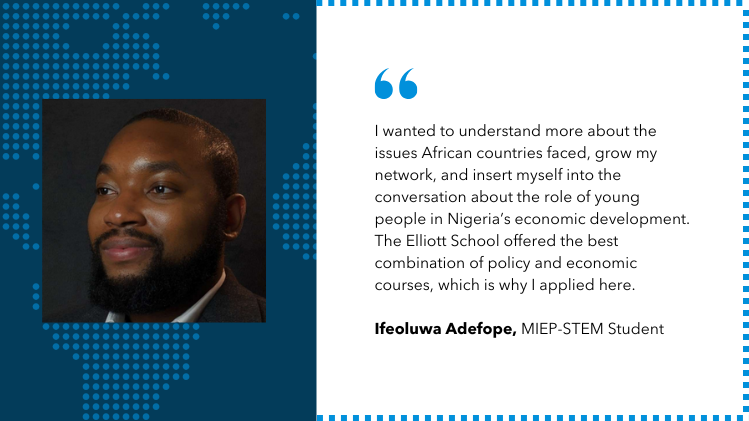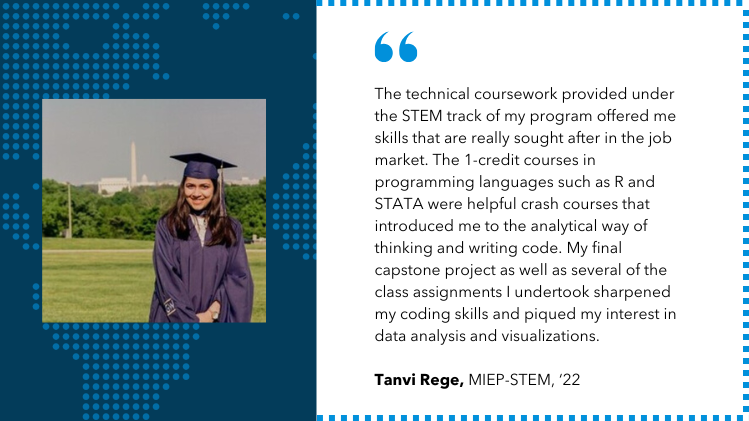International Economic Policy Master’s Programs
Do you want to have an influential role in shaping policy that has a global impact? Economics is about making good choices with limited resources. Navigating the field of international economic policy is exciting and exacting, as professionals tackle complex, nuanced scenarios with far-reaching implications. The Elliott School of International Affairs at the George Washington University offers two world-class master’s programs in International Economic Policy:
- The Master of Arts in International Economic Policy (MA-IEP) offers a robust foundation for students aspiring to pursue impactful careers in international economics, development economics, and international business. The program equips students with a blend of technical skills and real-world experience, providing a competitive edge in today’s dynamic and increasingly competitive job market. Through a comprehensive curriculum and hands-on opportunities, the MA-IEP graduates are prepared to tackle complex global economic challenges and drive policy solutions across diverse sectors.
- The Master of Science in International Economic Policy (MS-IEP) offers a rigorous foundation for students interested in both data-driven research and policy analysis. The program emphasizes advanced econometric techniques to analyze global economic issues, equipping students with the skills necessary to address complex challenges in today’s interconnected world. With a focus on the implications of economic policies for both national and international governance, the MS-IEP prepares graduates to use quantitative tools to design, evaluate, and implement effective economic strategies on the global stage. As a STEM designated degree, international students graduating from our MS-IEP degree are eligible to apply for an extra two years of work in the United States.
The International Economic Policy Programs are the right master's degrees for you if ...
- You want to study economic policy with an international focus.
- You’re a few years into your career and realize you need the right credentials, skills, and connections to advance.
- You’re finishing your undergraduate degree in economics, business, or a related field, and you want to move on to a graduate program that offers expertise and real-world work experience on a global scale.
- You previously studied international affairs or other fields, but now realize that an economic focus is key to advancing your career.
- You want to earn your master’s degree in international economic policy in the nation’s capital with access to some of the world’s most influential institutions, including the World Bank and the International Monetary Fund.
- You’re interested in an expedited master’s program that will allow you to graduate in a year and a half.
- Apply to the Master of Arts if...
- You enjoy analyzing economic trends on a global scale.
- You want to analyze and address global challenges, such as poverty reduction, environmental sustainability, economic inequality, and international conflict.
- You’re interested in a program that does not require prior knowledge of calculus or intermediate-level microeconomics and macroeconomics.
- You want to choose an area of professional specialization and tailor your master’s degree to your specific interests, such as Economic Development, International Business and Finance, and International Trade and Investment Policy.
- Apply to the Master of Science if...
- You are interested in policy evaluation, economic forecasting, or designing solutions to global challenges like poverty, inequality, or trade disputes.
- You are interested in data-driven decision-making or economic research.
- You would like to develop strong math and analytical skills, working with economic models, statistical methods, and policy evaluation tools.
- You are interested in using computational models to assess the impact of economic policies or predict outcomes.
- You are eager to work with large datasets to extract insights on market trends or policy effects.
- You’re an international student looking for a STEM designated program in order to be eligible to apply for two additional years of work in the United States.
The Elliott School’s MIEP degrees ensure you have the skills you need to help shape solutions to global economic challenges in the areas of government, finance, consulting, NGOs, and international organizations.
In our master’s programs, you will …
- Develop the tools, approaches, and business acumen you need to shape and implement economic policy in both the public and private sectors. The program balances skill development with deep knowledge and expertise. Core courses cover international trade theory and policy, development economics, statistics, and finance.
- Acquire practical skills and experience through your capstone. During your final semester, you will engage in small group, project-based work with the possibility to work with an external client. The capstone enables students to deepen their understanding of international economic policy while gaining practical experience, both of which are crucial for bridging the gap between academic learning and professional practice.
- Take advantage of the unparalleled professional and cultural connections Washington, D.C., and the Elliott School have to offer. Evening classes accommodate working professionals and students pursuing internships and part-time employment in Washington D.C. You will have access to key players as you attend events, work alongside experts as part of your capstone experience, and learn beside professionals.
- Network within a strong and diverse community of peers and faculty. Attending the Elliott School gives you access to other GW schools, faculty, and alumni. The connections you will make through GW and in D.C. will set you up for long-term success and an impactful career.
Master's Program Prerequisites
- Master of Arts Prerequisites
Economics
Course background in economics (micro- and macroeconomics) is a prerequisite to help prepare students to complete the graduate-level economics course(s) required within the M.A. in International Economic Policy curriculum. Course(s) must be successfully completed (grade of C or higher) through a regionally accredited institution in:
- Introductory Microeconomics
- Introductory Macroeconomics
Spring applicants must fulfill this prerequisite at the time of application.
Fall applicants may be admitted even if they have not fulfilled the economics prerequisite. In this case, the student is required to take the course(s) at a regionally accredited college/university prior to enrollment at the Elliott School. It is the student’s responsibility to complete the required coursework before classes begin.
Enrolling students who have completed these courses at the time of application will be required to complete online assessment(s) prior to the start of classes. AP credit cannot be used to meet the Economics Prerequisite. The Elliott School will not accept courses taken through services such as Coursera, Udemy, and other massive open online course (MOOC) services.
- Master of Science Prerequisites
Introductory Economics
Course background in economics (micro- and macroeconomics) is a prerequisite to help prepare students to complete the graduate-level economics course(s) required within the M.S. in International Economic Policy curriculum. Course(s) must be successfully completed (grade of C or higher) through a regionally accredited institution in:
- Introductory Microeconomics
- Introductory Macroeconomics
Applicants must fulfill the introductory economics prerequisite at the time of application.
Enrolling students who have completed these courses at the time of application will be required to complete online assessment(s) prior to the start of classes. AP credit cannot be used to meet the introductory economics Prerequisite. The Elliott School will not accept courses taken through services such as Coursera, Udemy, and other massive open online course (MOOC) services.
Intermediate Economics and Calculus
Course(s) must be successfully completed (grade of C or higher) through a regionally accredited institution in:
- Intermediate Microeconomics
- Intermediate Macroeconomics
- College-Level Calculus
Spring applicants must fulfill the intermediate economics and calculus prerequisites at the time of application.
Fall applicants may be admitted even if they have not fulfilled the intermediate economics and calculus prerequisites. In this case, the student is required to take the course(s) at a regionally accredited college/university prior to enrollment at the Elliott School. It is the student’s responsibility to complete the required coursework before classes begin.
Enrolling students who have completed these courses at the time of application will be required to complete online assessment(s) prior to the start of classes. AP credit cannot be used to meet the intermediate economics or calculus prerequisites. The Elliott School will not accept courses taken through services such as Coursera, Udemy, and other massive open online course (MOOC) services.
Learning, living, and working in the hub of thought leadership and global policy
A master’s degree in International Economic Policy from the Elliott School affirms you are knowledgeable in the areas of foundational economics, quantitative and descriptive analysis, and with the skills and connections needed to be competitive in the job market.
Differentiate yourself with the right degree and relevant, real-world work experience
When you graduate…
- You will have a skillset that is both practical and always in-demand as you pursue a career in public service, business, management consulting, development agencies and international organizations.
- You will have a deep understanding of global dynamics, positioning you to make a long-term impact. You will have a credible voice and seat at the table with your technical background and policy analysis tools.
- After demonstrating your abilities through your capstone, you will have the background sought by some of the world’s most prominent organizations, including the World Bank, U.S. International Trade Commission, Booz Allen Hamilton, the International Monetary Fund, IBM, and more.
- You will be well connected through a network of professionals and friends, and you will have lifetime access to career counseling, workshops, site visits, and information sessions with our Graduate Student Services office.
Career Placement After Graduation
A course of study designed for global impact
Advance in your career or internship while you earn your master's degree.
You can earn your degree in as little as one and a half years through evening classes that can accommodate even the busiest of schedules. Students may also work full time while completing the program on a part-time basis.
The program includes core courses in international trade, international macroeconomics, and development economics taught by GW faculty with deep experience in academia and policy making. You’ll develop an understanding of international economics theory, frameworks, models, and application practices. Courses in business and statistical analysis provide further training in skills critical to global economic policy.
Learn from experts in the field of international economic policy.
You’ll be guided by full-time GW faculty who are scholar-practitioners. They are seasoned experts in international economics; they are active in shaping policy and bringing real-world learning to the classroom.
Some of the respected names include Maggie Chen, Remi Jedwab, Graciela Kaminsky, Stephen B. Kaplan, Rafael Lopez-Monti, Mike Moore, Steve Suranovic, and many others.
Access career resources and influential organizations.
By being part of the Elliott School community in Washington D.C., you will have access to world-shaping speakers and guest lecturers. You will be able to attend events and classes at other GW schools. Within a 10-minute walk from GW’s campus are many of the key players in international economics — the IMF, World Bank, the White House, the Fed, Treasury, USTR, Washington International Trade Association, and others. Career coaches in the Elliott School’s Graduate Student Services office will help you make key connections and find relevant opportunities.
GW’s Institute for International Economics Policy
Through GW’s Institute for International Economics Policy, you can go deeper into research, attend events, and make meaningful connections. IIEP:
- Serves as a catalyst for high quality, multi-disciplinary and non-partisan research on policy issues surrounding economic globalization
- Hosts dozens of high-profile events yearly and supports a wide variety of GW faculty focused on issues such as international trade policy, international macroeconomics development economics and international political economy
- Gives MIEP students the opportunity to participate in research projects conducted by Institute researchers and attend the extraordinary events organized by IIEP
ITIP Legacy
Prior to academic year 2019, this program was called “International Trade and Investment Policy” affectionately known to alumni and faculty as ITIP. The ITIP program had a twenty-year history of training outstanding professionals in the broader field of international economic policy. While the name has changed, the MIEP and ITIP student body and alumni network combine the best features of the Elliott School: rigorous academics, strong professional development, and dedication to understanding the complexities of global challenges.
The 40-credit M.A. in International Economic Policy is no longer accepting applications. Current students will be supported through graduation, and can view the website here.
Contact Us
The graduate admissions counselors are some of the exceptional resources available to you through the Elliott School of International Affairs. Contact us directly with your requests or questions about the MIEP program. We’ll help you explore the benefits, align this opportunity with your career goals, or compare the MIEP degree with our other master’s programs in international affairs.
Call: (202) 994-7050
Email: esiagrad gwu [dot] edu
gwu [dot] edu
Information Session: Join us for an information session to speak with an admissions counselor.




